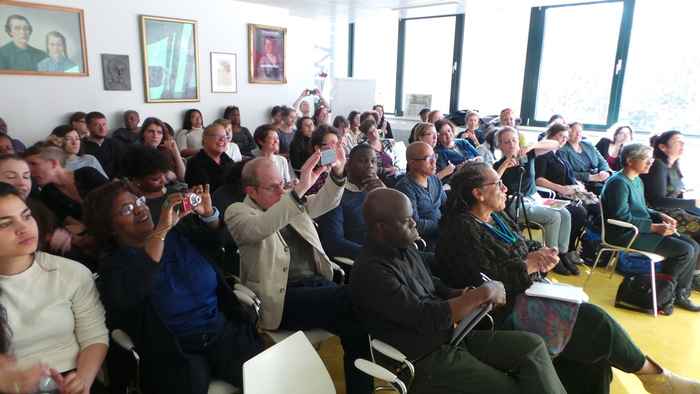On the Politics of Respectability in Colonial Curaçao
By Sruti Bala

Contesting Respectability
In a lecture hosted by Atria – Institute for Gender Equality and Women’s History titled “Contesting respectability: sexual politics in post-emancipation colonial Curaçao” (27 March 2017), Allen analysed how, following the abolition of slavery on the Dutch Caribbean islands (1863), a politics of ‘respectability’ emerged as a dispositive of governance, with the Roman Catholic Church taking the lead in instructing and policing the population. Respectability became the concept with which the supposed hypersexuality of Afro-Curaçaoan culture and the assumed destabilisation following the end of slavery could be regulated. Sharing numerous examples from her own oral history based research in the past two decades, Allen examined the devices and strategies developed on a communal level to commemorate and remember slavery. Songs from tambu festivities, proverbs and poems attest to a search for self-dignity and resistance to the gatekeeping function of ‘respectability’. Allen argued that respectability carried an intrinsic ambivalence: it guaranteed social mobility and advancement to some but at the cost of a collective self-constraint and degradation.
The Q&A was moderated by Esther Captain, oral historian at HvA.
Unheard Voices: Critical Perspectives on Oral History (28-29 March 2017)
The workshop focused on the methodology of oral history and the specific analytical and ethical questions it raises, especially when reflecting on subjugated lives and voices and sensitive, taboo issues. How to access and approach people who are ashamed or otherwise uninterested in talking about their past? How to balance the search for life stories and a thematic exploration? What needs to be remembered? Can we distinguish a ‘noble’ silence that needs to be respected from an ‘imposed’ silence? How to verify the reliability of sources? How to ask good questions? How to analyse, interpret and transmit an oral history research process? How to make sense of body language, humour, paralinguistic and performative elements? These are some of the questions that participants grappled with during the workshop, with inputs from Rose Mary Allen, based on her own extensive research experiences.
The workshop was attended by Research MA students from UvA, VU, Leiden, art academies and Institute of Social Studies in the Hague.